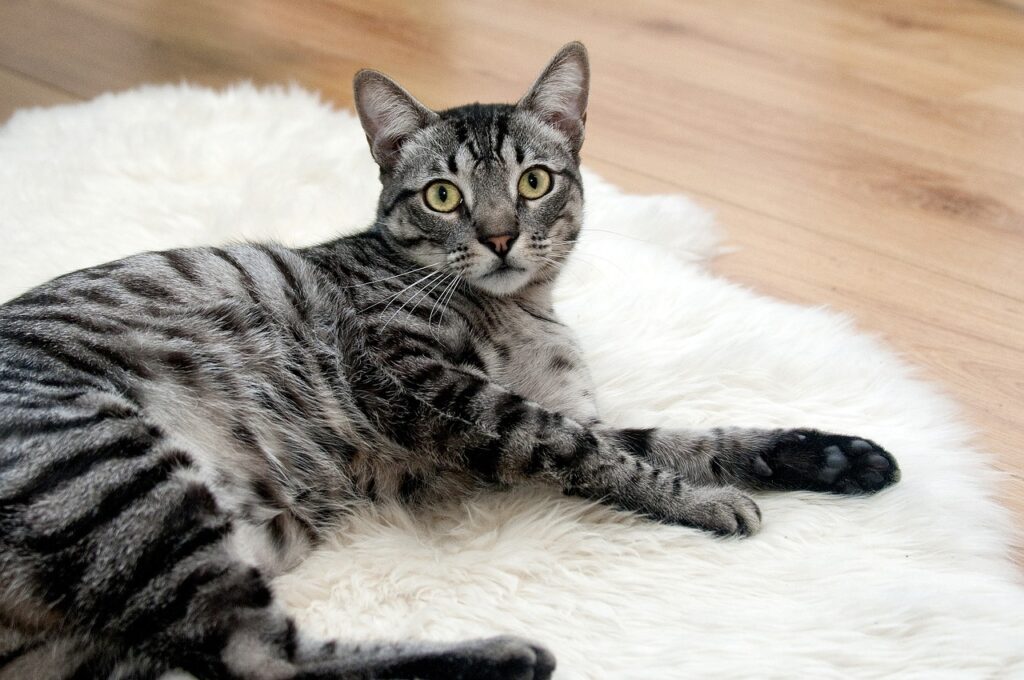Can Cats Eat Prawns? – Yes, They can
Cats can indeed enjoy prawns as an occasional treat. Prawns are packed with protein and other nutrients beneficial for felines. However, it’s crucial to feed prawns to your cat properly – cooked and without any added seasoning or salt. Giving prawns in moderation ensures your cat doesn’t eat too much of something outside their regular diet.
Can Kittens Eat Prawns?
Yes, kittens can have prawns, but with even greater caution. Their digestive systems are more sensitive, so introduce prawns in tiny amounts after they’ve been weaned. Keep an eye on how they react to this new food and only offer it as a small part of a balanced diet.
Things to consider when feeding prawns to kittens?
When giving prawns to kittens, make sure they’re fully cooked and cool to avoid any health risks. Start with tiny pieces to prevent choking and monitor closely for any adverse reactions, such as stomach upset or allergies. Also, consult with your vet to ensure it’s safe for your particular kitten.
Nutritional Benefits of Prawns for Cats – Why Prawns are good for Cats?
High Protein Content
Prawns are an excellent source of high-quality protein, which is essential for your cat’s muscle maintenance and overall body function. Protein is the cornerstone of a healthy feline diet.
Omega-3 Fatty Acids
The omega-3 fatty acids found in prawns can help maintain your cat’s coat health and reduce inflammation, which is beneficial for cats with joint issues or arthritis.
Taurine
Taurine is an essential amino acid for cats, and prawns have it in abundance. Taurine supports heart health, vision, and reproductive health in felines.
Vitamins and Minerals
Prawns contain vitamins such as B3, B12, and minerals such as phosphorus and selenium, which can support your cat’s immune system and metabolic health.
Low in Fat
Being low in fat, prawns are a great snack option for maintaining a healthy weight for your cat, provided they are cooked and served plain.
Potential Allergies: Can Cats Be Allergic to Prawns?
While it’s not common, some cats can be allergic to prawns. Just as with humans, each cat has individual sensitivities, and introducing new foods should be done cautiously.
Symptoms of Prawn Allergies in Cats
- Itching and scratching: If your cat begins to itch more than usual, this could be a sign of an allergy.
- Gastrointestinal discomfort: Look for signs of an upset stomach or changes in bowel movements.
- Respiratory issues: In rare cases, allergies can cause respiratory symptoms in cats.
What to Do If Your Cat Shows Symptoms?
- Stop feeding prawns: Eliminate prawns from their diet immediately.
- Veterinary visit: Take your cat to the vet for a proper diagnosis and treatment.
- Hypoallergenic diet: Your vet may suggest a hypoallergenic diet to determine the source of the allergy.
Recommended Amount: How Much Prawns Can a Cat Consume?
Feed prawns to your cat as a treat, not as a meal. A couple of small prawns once a week is typically sufficient. This ensures your cat’s diet remains well-balanced and prevents nutrient deficiencies or excesses.
Things to Consider When Feeding Prawns to Cats
Ensure prawns are cooked and unseasoned. Never offer raw prawns due to the risk of pathogens. Also, consider your cat’s overall diet when introducing treats like prawns – balance is key.
How to Feed Prawns to Cats: A Quick Guide
Prawns can be a delicious and nutritious treat for your cat when prepared and served correctly. Here are some simple and safe ways to please your pet’s palate.
Simple Steamed Prawns
Steam prawns until they’re thoroughly cooked. Let them cool, then peel off the shell and serve in small, bite-sized pieces.
Tasty Prawn Puree
Puree a cooked prawn with a bit of water to make a smooth paste – perfect for drizzling over their regular food for added flavor.
Grilled Prawn Delight
Grill prawns without any oil or seasoning until fully cooked. Once cooled, cut into appropriate sizes for a tasty treat.
Conclusion
In summary, cats can safely eat prawns if they’re cooked and plain. Prawns offer valuable nutrients that can contribute to your cat’s health, but they should only be an occasional treat, not a staple of their diet. Monitor your cat for any signs of allergies and consult your vet if in doubt about introducing new foods. With thoughtful preparation, prawns can be a delectable treat for your furry companion.



